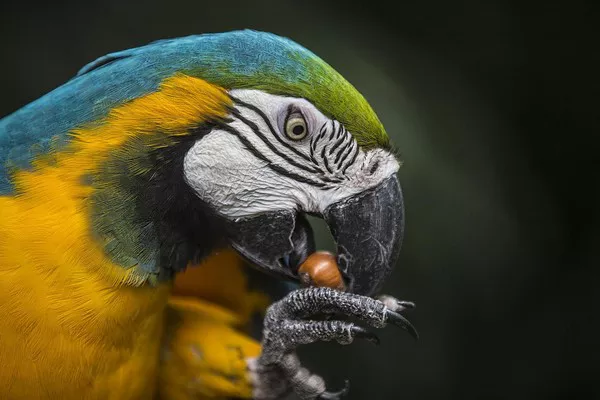Sun conures (Aratinga solstitialis) are vibrant, intelligent, and affectionate parrots known for their striking plumage and lively personalities. Native to northeastern South America, these birds are popular pets due to their engaging behavior and colorful appearance. As with any pet, understanding their needs and behaviors is crucial for ensuring their well-being and strengthening the bond between owner and bird. One common question among sun conure owners is whether it is safe or advisable to kiss sun conures. This article explores various aspects of this question, including health, behavior, and bonding considerations.
Understanding Sun Conure Behavior
Social and Affectionate Nature
Sun conures are highly social birds that thrive on interaction and companionship. In the wild, they live in flocks and engage in various social behaviors, such as mutual preening and vocalizing. As pets, they seek similar social interactions with their human caregivers. They often enjoy being close to their owners, sitting on their shoulders, and being involved in daily activities. This affectionate nature makes them responsive to gestures of affection, including physical contact.
Body Language and Communication
Sun conures communicate through a range of vocalizations and body language. Their body language can indicate their mood and comfort level. For example, a relaxed sun conure may puff out its feathers, preen, or nuzzle against its owner. Conversely, if a bird feels threatened or uncomfortable, it might display defensive behaviors, such as flapping its wings, biting, or vocalizing loudly. Understanding these signals is essential when determining whether a gesture like kissing is appropriate.
The Safety and Health Considerations
Risks of Bacterial and Viral Transmission
One of the primary concerns when considering kissing a sun conure involves health risks. Birds can carry various bacteria and viruses that might be transmitted to humans. For example, psittacosis, also known as parrot fever, is a bacterial infection that can be transmitted from birds to humans. While the risk of transmission from kissing is relatively low, it is important to practice good hygiene and be aware of any signs of illness in your bird.
See Also: What Can I Feed My Sun Conure?
Sun conures also have sensitive respiratory systems, and exposure to potential pathogens from human saliva could pose a risk to their health. Maintaining proper hygiene, such as washing hands before and after handling your bird, can help reduce these risks.
Allergens and Irritants
Human saliva contains various substances, including enzymes and bacteria, that could potentially irritate a bird’s delicate skin and feathers. In some cases, birds may develop allergic reactions or skin irritations from close contact with human saliva. It is important to monitor your bird for any signs of discomfort or health issues and consult a veterinarian if any concerns arise.
Bonding and Affection: Best Practices
Alternative Ways to Show Affection
While kissing a sun conure may not be advisable, there are many other ways to express affection and strengthen your bond with your bird. Positive reinforcement techniques, such as offering treats, engaging in play, and spending quality time together, can be effective in building a strong, trusting relationship. Interactive toys, training sessions, and regular social interaction are also excellent ways to keep your sun conure happy and engaged.
Understanding Your Bird’s Comfort Zone
Each sun conure has its own comfort level with physical contact. Some birds may enjoy being held and cuddled, while others may prefer more independent interactions. It is essential to pay attention to your bird’s reactions and respect its boundaries. Gradually introducing new forms of contact and observing your bird’s responses can help ensure that interactions remain positive and enjoyable for both you and your feathered friend.
Hygiene and Health Precautions
Regular Veterinary Check-ups
Regular veterinary check-ups are crucial for maintaining your sun conure’s health. A veterinarian specializing in avian medicine can help monitor your bird’s overall well-being, address any health concerns, and provide guidance on proper care practices. During these visits, you can discuss any specific questions or concerns related to interactions with your bird, including issues related to kissing or close physical contact.
Clean Environment and Proper Care
Maintaining a clean living environment is essential for preventing the spread of diseases and ensuring your bird’s health. Regularly cleaning your sun conure’s cage, toys, and food and water dishes can help reduce the risk of infections and ensure a healthy living space. Additionally, providing a balanced diet, fresh water, and opportunities for exercise are key components of good avian care.
Understanding the Bond Between Owner and Bird
Building Trust Through Positive Interactions
Building a strong bond with your sun conure involves creating a positive and trusting relationship. Positive interactions, such as gentle handling, praise, and treats, can help reinforce your bird’s trust and affection. Establishing a routine and being consistent with your interactions can also contribute to a stronger bond and a more comfortable relationship.
Recognizing and Addressing Behavioral Issues
Understanding and addressing behavioral issues is an important aspect of maintaining a healthy relationship with your sun conure. If your bird displays signs of stress, aggression, or discomfort, it is essential to identify the underlying cause and address it appropriately. Consulting with an avian behaviorist or veterinarian can provide valuable insights and solutions for managing behavioral challenges.
Conclusion
In conclusion, while kissing a sun conure may be a gesture of affection, it is important to consider the potential health risks and the bird’s comfort level. Sun conures are social and affectionate birds that thrive on positive interactions and bonding activities. Understanding their behavior, practicing good hygiene, and respecting their boundaries are key factors in ensuring a healthy and happy relationship with your feathered friend. By focusing on alternative ways to show affection and maintaining proper care, you can strengthen your bond with your sun conure and provide a loving and supportive environment for your pet.
Related Topics:























